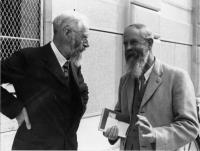A test of the efficacy of this work was to come three years later in Brookes' own University of Pretoria. An English-speaking professor wrote a book which was offensive to the Afrikaner people. The author was tarred and feathered by the outraged Afrikaners, and in the ensuing rumpus the university became, in January 1933, wholly Afrikaans- speaking. English-speaking professors, including Brookes, lost their jobs. At the centre of this move was the Professor of Economics, Arthur Norval, whose father had been killed by the British in the Boer War.
Norval was induced by his wife to attend an Oxford Group meeting at the home of W. H. Hofmeyr, the headmaster of the Pretoria Boys' High School. One of the speakers was Dr Brookes. Norval wrote later: 'On my return from the meeting I spent one of the most dreadful nights in my life ... I could not go on hating and fighting the English . . . but I could not face the costs as I realised it would mean . . . being looked upon as an outcast and betrayer amongst those whom I counted my dearest friends and with whom I had fought for years for a cause ... I obeyed God and paid the price. On the very moment I accepted God's challenge, my hatred for the English passed completely out of my being, and in its place there came a love which I cannot describe, and which has grown in intensity ever since.'26

Soon afterwards Norval invited the national leadership of both communities to Pretoria City Hall. For twenty-five minutes he spoke to them in the English language he had sworn never to use again. Beside him stood Edgar Brookes. For many years, even up to World War II, such reconciliations remained a continuing influence. At one point C. F. Andrews travelled to South Africa to oppose some anti-Indian legislation. 'I was met by new friends and helpers in the Group,' he said on his return. 'Some were Afrikaners. Others were English. What had seemed impossible was accomplished. The hostile legislation was withdrawn.'27
Six of Buchman's party decided to stay on in South Africa. His team had not pleased everyone; and even some of those who had initially been helped broke away. Buchman, they declared, had not mentioned the Cross or the Blood of Jesus Christ often enough and they were going to correct the error. Calling themselves The New Experience, they were to be the first of several breakaways from Buchman's work during the 1930s. As later, Buchman's response was to do nothing. He had no intention of trying to enforce uniformity.
143
Photo: CF Andrews (right) first met and worked with Buchman in India.
©Scoville Wishard/MRA Productions